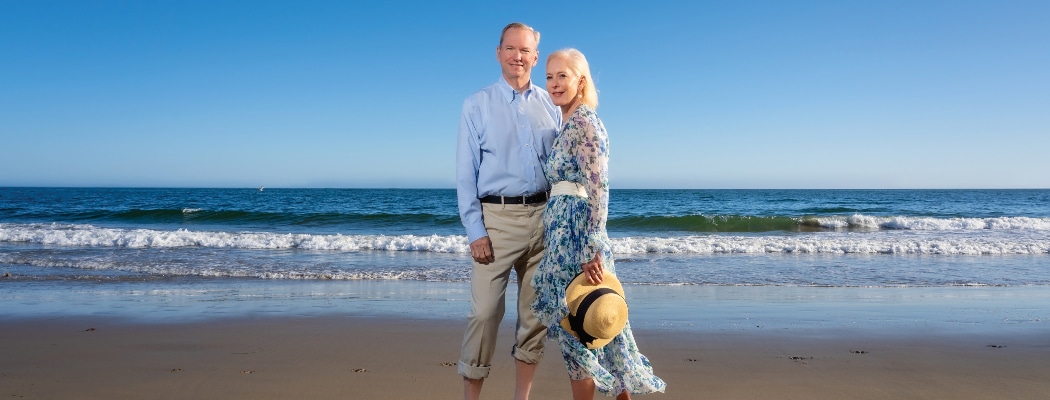An exclusive conversation with Wendy and Eric Schmidt.
“Never doubt that a small group of thoughtful, committed citizens can change the world; indeed, it’s the only thing that ever has.” — Margaret Mead
Can one person change the world? The answer is unlikely; however, when you put two of the right people together, the odds increase dramatically. Enter Wendy and Eric Schmidt, whose portfolio of philanthropies are strategically positioned to help change the planet.
 The former chairman of Alphabet Inc. and CEO of Google, Eric Schmidt has helped revolutionize global interactions by putting the internet on a new trajectory. Advisor to three U.S. presidents, Schmidt is on every list of the world’s most influential people and is now turning his sights from the private sector to a dizzying array of nonprofit initiatives. His essential partner in the family’s philanthropic ambition is his wife, Wendy, who since 2006 has served as president of their $1 billion Schmidt Family Foundation. Together, they’ve also founded Schmidt Ocean Institute and Schmidt Futures.
The former chairman of Alphabet Inc. and CEO of Google, Eric Schmidt has helped revolutionize global interactions by putting the internet on a new trajectory. Advisor to three U.S. presidents, Schmidt is on every list of the world’s most influential people and is now turning his sights from the private sector to a dizzying array of nonprofit initiatives. His essential partner in the family’s philanthropic ambition is his wife, Wendy, who since 2006 has served as president of their $1 billion Schmidt Family Foundation. Together, they’ve also founded Schmidt Ocean Institute and Schmidt Futures.
After the Schmidts came to Nantucket twenty years ago, the couple’s impact on the island—largely driven by Wendy—has been as significant as any individual’s since Walter Beinecke. The creator of ReMain Nantucket and the force behind renovations at Mitchell’s Book Corner, Greenhound, 56 Center Street (home to the Community Music Center and Nantucket Community School), 22 Federal (home to The Corner Table and the Nantucket Culinary Center), the Dreamland Theater and a wide range of other activities on the island, Wendy has consistently viewed Nantucket as a place for test driving new ideas that could have global implications. From innovative concepts on resilience, to energy efficiency and beyond, she is elevating Nantucket’s role as an incubator for creating environmental solutions.
N Magazine sat down with the Schmidts to learn about their various philanthropic initiatives, their goals and their view of the future.
When you first came to Nantucket, did you view it as a place to relax or did you have a larger vision at the outset?
WENDY: Although we grew up on the East Coast, we are Californians, since meeting in graduate school at Berkeley in 1978. When our children were growing up, we had a house on Cape Cod where my mother was spending her summers. It was a friend’s anniversary party held on Nantucket in the summer of 1999 that brought us to the island. We were walking up Main Street, looking at each other, and we said, “What are we doing on the Cape?” This is what we thought we were coming to experience. We bought our first house three days later and visited the island as summer people do—enjoying what the island has to offer, until I started sailing in 2007. Google had gone public. We’d started our foundation and I had been meeting lots of people who grew up on Nantucket, particularly when I spent time sailing around the island. We began to think deeply, “What is it like for people who live on Nantucket year-round and raise their families and work here? Could our philanthropy, in fact, do something with the infrastructure and try to create better opportunities for people in the digital age? Is it possible to create a thriving, year-round downtown for people in a place that has this great history of independence and innovation? And, of course, could we look at its future resilience in the face of climate change?” So we’ve been connected to the island for more than twenty years, and ReMain has been at its task since 2008.
ERIC: There was a point in which Wendy decided that Nantucket was a good place for trying to help a historic American community involve its historically diverse population in building its future, both technologically and in facing climate and environmental issues. The beauty of Nantucket is that it’s small enough that everybody knows each other. You have local politics, obviously, but fundamentally everybody cares deeply about the island. So, an island is not a bad place to see if you can scale the vision of sustainability as Wendy did with ReMain.
Your philanthropy ranges from improving and extending human life, to identifying young people who have the potential to solve global problems, to advancing ocean science and beyond. What is the theme of your philanthropic efforts?
WENDY: We were baked in the Silicon Valley culture. We have lived through very rapid change since we left graduate school to address systemic problems. The culture itself is one that believes in the power of individuals to innovate and to think differently. It’s made us into systems thinkers, so the problems that we look at are all connected. The other unique thing about us is that we have a very venture-based and investment-oriented approach to philanthropy. Philanthropy can be very important as a palliative tool— for institutional support, the arts and so on—but there’s another kind of philanthropy that we’re interested in that’s transformative. We try to look at what’s broken and see if we can use the power of this energy of philanthropy to help things that are underway to change for the better. To use Eric’s phrase from his podcast during the pandemic—to reimagine the world. With the tools we have today, we can solve so many problems because we can see the world more accurately than we ever could before and we can communicate quickly.
Explain your interdisciplinary approach to recruiting talent.
ERIC: What I realized was that we care uniquely about people. At the end of the day, it’s high-skills people who change the world. They’re the entrepreneurs, they’re the leaders. Wendy and I discussed this and we built a set of programs through our philanthropic initiative Schmidt Futures. First was the Schmidt Science Fellows, which is where we look for people who are getting Ph.D.s that want a multidisciplinary change.
So they are an astrophysicist who wants to work on cancer, or a mathematician who wants to solve an environmental problem. People who are at that level of ability that want to move to an adjacent field have the highest potential of all. So we set up a program to enable them to do that. That seems to have been enormously successful.
WENDY: The interdisciplinary approach is fundamental to almost everything we do. Those interesting things happen at the edges. We grew up in a world of silos. If you were an astrophysicist, you didn’t do cancer research. It’s really interesting when you apply the knowledge and learning from one field to another. Secondly, when you listen to people in their communities, they’re responsible for their own future. Whether you’re on an island with a growing infrastructure or whether you’re a small village in Ghana where you’re being displaced by foreign mining interests, the human rights component is core. And you’ve got to come out of your silo and listen to your community.

You made a recent gift of $150 million to the Broad Institute of MIT and Harvard focusing on improving human life and, I presume, lifespans. The recent Moderna experience suggests that science is almost unlimited in what it can do. In terms of longevity alone, how do you see your ability to influence lifespan?
ERIC: At the Broad Institute, where I’ve now just become chairman, there was a proposal to work on the language of life. The problem is that cells communicate in ways we don’t fully understand. So the gift that we gave was to fund a ten-year program to try to use every conceivable digital technique to figure out the mechanisms of how the cells talk to each other. It’s pure science discovery. We obviously care about lifespan, and we care a lot about human health, but it’s really about understanding the underlying biological mechanism. It’s probably the highest leverage enterprise that we, as non-scientists, could fund.
WENDY: With respect to your question about lifespan, we’re not going to live longer as a species in the face of higher global temperatures and the geopolitical chaos this can engender. We face new vectors of disease, including viral spread; loss of biodiversity, forests and topsoil; and destruction of habitats, including our life support system in the ocean. Our planetary systems have evolved for more than 4.5 billion years, while the reign of humans on the Earth has lasted for only about 200,000 years.
Under current models of climate change, there will be places on Earth that are destined to become uninhabitable deserts, as is already occurring in the Sahel in Africa. Climate change threatens to overheat many cities in the Southern Hemisphere, and we know that temperatures that reach 150 degrees Fahrenheit begin to cook our internal organs, so are unsuitable for human life.
 Tell us about the Rise program that you have created, which seeks out young individuals with extraordinary promise as potential problem solvers. When you distill it down, are you essentially global talent scouts?
Tell us about the Rise program that you have created, which seeks out young individuals with extraordinary promise as potential problem solvers. When you distill it down, are you essentially global talent scouts?
WENDY: The Rise program is so interesting because Eric always talks about all the talent in the world that nobody knows about. There’s never been anything like this program, which will offer young people in their teens from all around the world a path to being recognized, being educated, being connected. As this program continues, a cohort of people who are supported for their lifetimes will be turning their talents toward public service.
How do you identify the talent?
ERIC: We decided that we needed a partner and chose the Rhodes Trust. Because if you think. about it, if you were me—a computer scientist—you would want to do the entire global selection digitally. You’d want to have a super computer algorithm that would say, “These are the smartest people in the world. Here are the tests. We know it. We can prove it.” But that’s not in fact how life works. You can use the computer to do a screening, but at the end of the day, all of these selections involve managing powerful sets of human judgments, which the Rhodes Trust does expertly. No one’s ever done anything like this before.
WENDY: The projects are really interesting. This is a very early stage effort, but we had one of the finalists in the first Rise class develop a platform to track seismic vibrations across cities. Another one built a model to better predict climate change. Another made a biodegradable straw out of leaves and beeswax. So these young people are identified within their own community and if they want to be part of this program and join this community, then we should have this wonderful set of leaders coming into the world in the decades to come.

Let’s shift to a different geography. The Schmidt Ocean Institute, combined with your focus on ocean health, has done a tremendous amount of research and made some fascinating discoveries. What concerns you most about the future of our oceans and is there a path to recovery?
WENDY: The biggest threat is invisible and that’s a problem. The changes in our atmosphere that have been occurring over the last hundred years have led to an increasing acidification in the ocean, as well as warming. This is extremely dangerous because it’s basically changing the chemistry that has supported life as we know it. The ocean is currently as acidic as it was fifty million years ago. That happened over millennia when it changed before, and now we’re changing ocean chemistry over decades. This is very dangerous. We’re actually tinkering with our life support system, where half of all the life on Earth resides. Almost half of humanity gets its primary protein from the oceans. Two billion people make their livelihoods on the ocean—a quarter of humanity. The oceans are under attack from not only pollution, but overfishing, noise, fifty thousand oil tankers crisscrossing the ocean every day before COVID. It’s really a problem of our activity at scale. It probably didn’t matter when my mother was born in 1931. You could probably burn all the fossil fuels you wanted and it wouldn’t make an impact. But now we have to change the way we live because our activity is threatening the ocean. So I would say the biggest threat to the ocean, to borrow from [renowned marine biologist] Sylvia Earle, is ignorance—that is what has to change.
Let’s draw this closer to Nantucket. Eric mentioned using Nantucket as a model, and the Envision Resilience Nantucket Challenge that you have created is designed to find solutions that have global applications. Tell us about Nantucket’s role in solving problems far beyond our shores.
WENDY: Envision Resilience was a project that we thought about in 2019, before the pandemic. The idea was to involve graduate students—people from off-island, people from on-island—in a project that would help jump-start the vision for the future, to come up with an adaptive approach for how residents and businesses could live with rising water. We approached major universities and ended up with five, including Harvard, Yale, Northeastern, the University of Miami and the University of Florida. They created a studio design project. We had twenty on-island advisors as well as off-island guest speakers representing a wide variety of professions doing weekly talks. We had this entire scope of the project along Nantucket’s waterfront to be studied for them to give us their idea of what is going to happen. Nantucket has this history of continual adaptation. So what would that vision look like in the eyes of these students? Because of the pandemic, all their work was all done remotely, with an extraordinary deep dive into the geologic, environmental and social aspects of sea level rise. Their designs are on display at the Macy Warehouse through December. We would love Nantucket to be the model for how other coastal communities could approach their own future.

People on Nantucket always ask how long Nantucket is going to be viable. Based on our current trajectory, how long will Nantucket be above water?
ERIC: A lot of it depends on the rate of warming in Greenland and the western Antarctic ice sheet. A true collapse of those, which is possible, would be a real emergency for Nantucket. That’s the less likely scenario. The more likely scenario is this gradual and unstoppable rise in oceans, which is also due to both heating— because as the water gets hotter, it gets bigger—as well as the addition of ice into the water. The modeling indicates that we have a hundred years kind of number—it’s more than ten. The alarmists will say it’s unstoppable, but that doesn’t mean that it happens immediately. I think that the most likely scenario for Nantucket is more flooding. The danger is with high tide when you have a big storm— water is what does all the damage. That is inexorably going to get worse at some rate.
It sounds like a race against time. How quickly can you help develop solutions, implement the solutions and have the solutions work before irreparable damage is done? And is it realistic that we can stop the clock or reverse the damage?
WENDY: I don’t think the problem is technical, so much as political. The political will is lacking to make these changes. We know how to do it. We need to do it. Will we do it? I hope so. We come from a background of optimism, and we know the world has changed the way we do everything in the last forty years thanks to computers. And even my little iPhone here, this didn’t exist before 2007. We have all the tools to change human behavior. The challenge is how do you make that happen? And what are the right incentives?
Speaking of devices, we have technology today that we didn’t have ten years ago. Ten years ago, we had technology that we didn’t have twenty years earlier. What type of technology do you envision us having twenty years from now that will be the iPhone revolution of tomorrow?
ERIC: At the moment, the answer in the industry is more powerful phones and much more powerful apps. That’s a safe bet. What is not clear is what happens in addition to that, because the phones are so defining now. The fact that you can talk to each and every human on a supercomputer that’s in their hand is a very sexy thing. If you were to ask me to speculate, I would say that the biggest change will come from an artificial intelligence ability to converse in a human-like way. I’ve written a book with [former U.S. Secretary of State Henry] Kissinger on the future of AI, which comes out in October. We talk about what are called universal models of knowledge. These computers are going to be aggregating an enormous amount of knowledge inside of them. And no one knows quite how they’re going to be used. Are they going to solve problems? Are they going to generate misinformation? Are they going to be human advisors? All is up for grabs. And that’s probably the sexiest part of the tech industries’ investment. There’s an enormous amount of money going into these. Part of the reason that I’m not giving you a very precise answer is that the computation required to build these supercomputers with this kind of knowledge is not known, but thought to be in the billions and billions of dollars. It’s very different from an iPhone.

The speed with which technology has advanced is geometric. What are your greatest fears of what could happen if technology goes the wrong way?
ERIC: We all see many good movies that have elements of these stories in them. Whatever that scenario is, it’s not true today. Where we are today is that these tools are enormously powerful for discovery, for monitoring, for science, for invention and so forth. It’s going to be a fairly long time before they’re in live critical situations, like the robot is driving me or the robot is operating on me. Because we won’t tolerate failure. People have been working on self-driving cars since 1997. You did not drive a self-driving car today in Boston. Why? It’s a really hard problem, because we can’t tolerate failures. There was a self-driving car crash involving a Tesla into the back of a truck. It was front-page news in all the newspapers. On that same day, there were roughly ninety other terrible car accidents driven by humans, caused by humans, that did not get on the front page. So I think we need to put these things into perspective. These tools are enormously powerful. They have downsides, but would I prefer to have the smartphone, the AI system, the knowledge network and all that intelligence at our disposal as humans? Yes. But I want us to be in charge of it.
You both live very purposeful lives, and it’s hard to imagine what Eric and Wendy Schmidt do that is just purely fun. What are the things that you do that are outside of the realm of doing, creating and planning the type of work that we associate with both of you? What is the other side?
 WENDY: I don’t know if there is another side. I honestly think we feel lucky every day to be able to do what we’re doing. We get to learn something every day. Something we don’t know anything about. So it’s just enormously interesting. For Eric, I think it’s learning quantum physics. For me, lately it’s been trying to understand microbial life. Every day, we get to engage with these committed, passionate people who want to change the world for the better. I mean, that’s just very satisfying, like watching your own children grow up. We have the most fun just talking together, really.
WENDY: I don’t know if there is another side. I honestly think we feel lucky every day to be able to do what we’re doing. We get to learn something every day. Something we don’t know anything about. So it’s just enormously interesting. For Eric, I think it’s learning quantum physics. For me, lately it’s been trying to understand microbial life. Every day, we get to engage with these committed, passionate people who want to change the world for the better. I mean, that’s just very satisfying, like watching your own children grow up. We have the most fun just talking together, really.
ERIC: Curiosity is very powerful as an entertainment device. We’re in a position now where every day is full of new things, some of which are really interesting, some of which are really important. It’s not possible to know exactly which, because sometimes they work out and sometimes they don’t. But they’re all fascinating. If you’re driven by curiosity, right, then everything else works itself out just great.
I assume that your philanthropies are now your life’s work. At the end of the day, what would you both deem as collective success of your efforts?
WENDY: I have an incentive I use to describe how we can measure the success of our work. It’s called the 10 percent rule. According to a 2010 study that came out of Rensselaer Polytechnic Institute, you only need a committed group that is 10 percent of any population to shift everyone else to their goals—whether this is a religious belief, or a fashion trend, a political goal or a behavior.
We can get to that 10 percent in our lifetimes—to rebuild an industrial sector that is circular by design and eliminates waste and results in a far more sustainable human footprint on Earth’s planetary systems: air, ocean and soil. We can already see the commitment in many industries to decarbonizing, to reducing waste or eliminating it by design. We’re seeing investment in agriculture to bring ocean plants into our diets as primary proteins, and in the ocean to rebuild coral reefs.
We have just entered the UN Decade of Ocean Health, and we’re going to find, a decade from now, far more effective international ocean protection policies than we have today that will preserve our life support system for future generations. We hope to have a full map of the ocean floor by then, as full a map as we have right now of the surface of Mars.
ERIC: We believe the pairing of life sciences with data science at the Schmidt Center at the Broad Institute will yield breakthroughs we all hope for— better diagnostics, treatments and even cures for killers like cancer, heart disease and neurodegenerative conditions.
And with our work to lift up talent, we hope to create the largest and most persistent network of exceptional people worldwide. If we can match those people to opportunities to serve others—for life—we can build knowledge and solve hard problems that everyone faces, like wiring the world or defeating COVID-19.
Thank you both for your time and sharing your insights with us.







